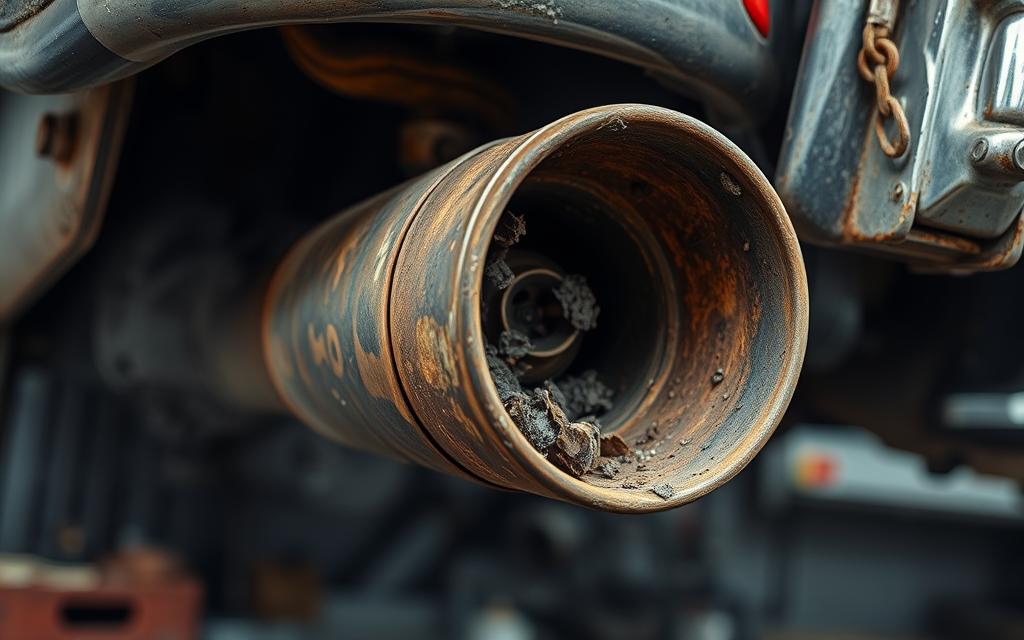The muffler is key to a car’s exhaust system. It cuts down on noise and safely sends exhaust gases out. It works by forcing gases through tubes with holes, which breaks up their energy. A good muffler is vital for your car’s performance, fuel use, and safety.
Knowing the signs of a clogged muffler is important for your car’s health. Look out for changes in engine performance, odd noises, and lower fuel efficiency. These are all signs of a possible muffler problem.
Key Takeaways
- Spotting common signs of a clogged muffler, like loud noises and lower fuel economy, can help catch issues early.
- A bad muffler can make your car use more gas because of poor exhaust flow. This hurts your engine’s performance.
- Muffler issues can also make your car use more fuel, mainly when you’re speeding up or going uphill.
- Regular checks and maintenance of your muffler can make it last longer and save you money on repairs.
- Fixing muffler problems quickly is important. They can harm your car’s engine and emissions systems if left unchecked.
Understanding Muffler Functionality
Mufflers are key to a vehicle’s exhaust system. They help reduce engine noise and control emissions. This makes driving quieter and better for the environment.
Importance of a Properly Functioning Muffler
A good muffler is vital for a vehicle’s exhaust system. It forces exhaust gases through chambers and tubes. This disrupts sound waves, making the cabin quieter.
It also directs harmful gases away from the vehicle. This protects passengers from health risks.
How Mufflers Reduce Noise and Emissions
Mufflers use sound-dampening materials and chamber designs to reduce noise. As exhaust gases pass through, sound waves are disrupted. This makes the exhaust note much quieter.
They also control emissions by ensuring exhaust gases are properly treated. This prevents harmful gases from entering the environment.
| Key Muffler Facts | Statistics |
|---|---|
| Muffler Lifespan | Most new mufflers last 40,000 to 80,000 miles, or two to four years, depending on driving conditions and the vehicle’s make and model. |
| Muffler Replacement Cost | A new muffler can cost between $175 and $450 or more, while labor for replacement may cost between $50 and $200. |
| Exhaust System Importance | The exhaust system is vital for maintaining better engine performance and fuel economy, and immediate repair or replacement of a failing muffler is necessary to prevent further damage. |
Having a working muffler is crucial for a vehicle’s exhaust system. Knowing how mufflers work helps owners spot problems early. This way, they can fix issues before they get worse.
Common Symptoms of a Clogged Muffler
A clogged or malfunctioning muffler can cause various concerning symptoms. These symptoms impact both the performance and safety of your vehicle. Recognizing these signs early is crucial to maintaining your car’s optimal condition.
Changes in Engine Performance
One of the primary indicators of a clogged muffler is a noticeable decline in engine performance. A performance muffler from CORSA PERFORMANCE can deepen exhaust notes and add horsepower. But, a clogged or faulty muffler can lead to sluggish acceleration. This can be frustrating and potentially dangerous in certain driving situations.
Unusual Noises from the Exhaust System
Another common symptom of a clogged muffler is the presence of unusual noises coming from the exhaust system. Drivers may notice a rumbling, growling, or even a loud, roaring sound, during acceleration. These exhaust noises are a clear sign that the muffler is not functioning as it should.
It’s important to address these issues promptly. A malfunctioning muffler can also impact fuel efficiency, leading to more frequent trips to the gas station. A clogged muffler can also contribute to dangerous emissions, potentially causing respiratory problems for the driver and passengers. Regular maintenance and prompt attention to any changes in engine performance or exhaust noise can help extend the life of your muffler.
| Symptom | Impact |
|---|---|
| Sluggish Acceleration | Reduced engine performance, making it harder to gain speed quickly |
| Rumbling or Growling Exhaust Noises | Indicates a malfunctioning muffler, with exhaust gases not being properly expelled |
| Decreased Fuel Efficiency | A clogged muffler can lead to more frequent refueling trips, indicating a drop in fuel economy |
| Dangerous Emissions Odor | The presence of a strong odor from emissions can lead to toxic fumes inside the vehicle, potentially causing respiratory issues |
Most new mufflers last 40,000 to 80,000 miles, or two to four years, depending on driving conditions and the vehicle’s make and model. Regular inspections and timely replacements can help ensure your muffler is functioning optimally.
Decreased Fuel Efficiency
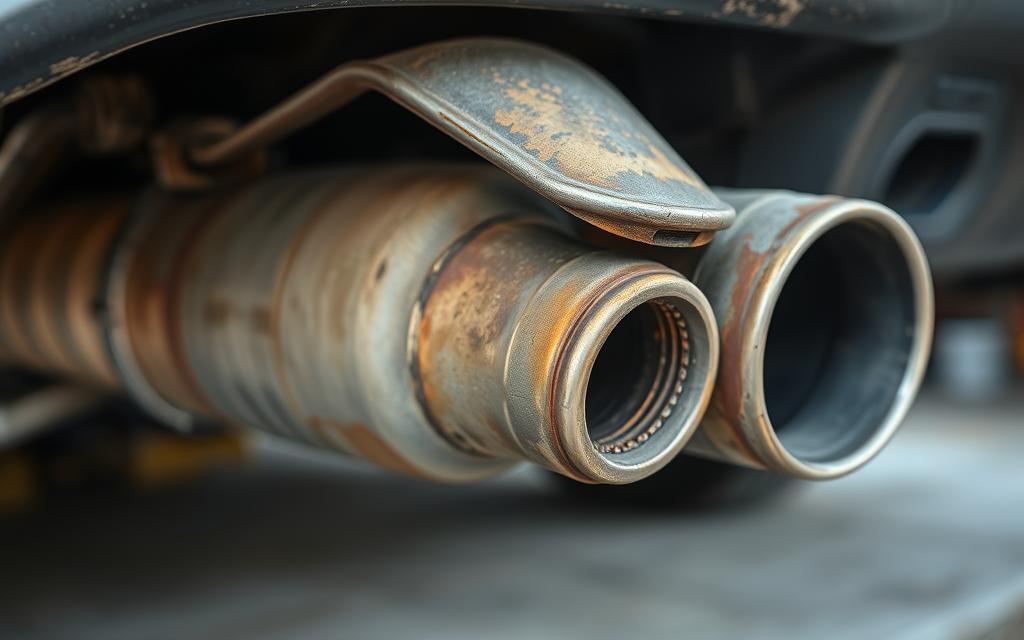
A clogged or damaged muffler can really hurt your car’s fuel economy. If your car starts using more fuel than usual, it might be a sign of a problem with your exhaust system.
Signs of Increased Fuel Consumption
Do you find yourself filling up your gas tank more often? Or has your car’s MPG gone down without reason? These could be signs of a failing exhaust system. Getting your exhaust fixed quickly can help your car use fuel more efficiently and save you money.
Impact of Muffler Issues on Overall Engine Health
If your exhaust system isn’t working right, your engine has to work harder. This means it uses more fuel. Over time, this can harm your engine and lead to expensive repairs.
Most new mufflers last between 40,000 to 80,000 miles or two to four years. This depends on how you drive and your car’s make and model. Keeping your muffler in good shape can help your car’s fuel economy and engine efficiency last longer.
“Decreased gas mileage is a common sign of muffler problems, indicating disruptions in the exhaust flow.”
It’s crucial to fix muffler problems quickly to avoid more damage. By being proactive and fixing issues fast, you can keep your car running well and save on fuel.
Engine Overheating Indicators
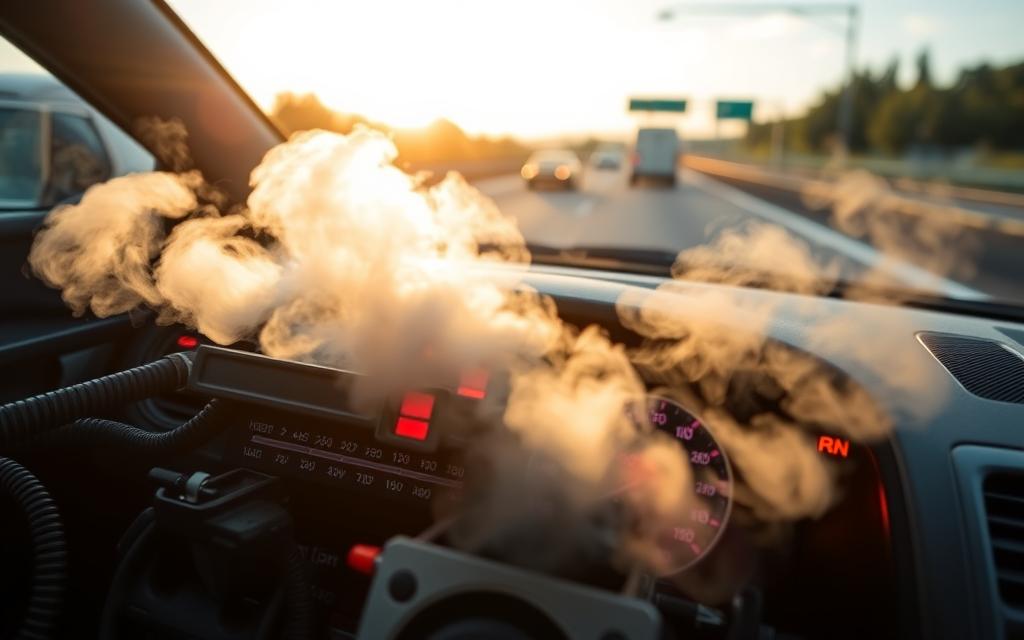
A clogged muffler can cause your engine to overheat. When the exhaust system is blocked, it makes it hard for the engine to get rid of hot gases. This can lead to a rise in engine temperature, which can cause serious damage if not fixed.
Signs of Excessive Heat in the Engine Bay
If your temperature gauge shows high levels, it might mean your exhaust system is blocked. Also, steam, smoke, or strange noises from the engine can mean it’s running too hot.
Connection Between Muffler Clogs and Overheating
- A clogged muffler blocks exhaust flow, causing back pressure. This makes it tough for the engine to get rid of hot gases.
- This situation can lead to a rise in engine temperature. It can cause overheating and damage.
- Symptoms of engine overheating include warning lights, high temperature gauge readings, visible steam or smoke, reduced engine performance, and unusual noises.
If you see any of these signs, you need to fix the problem fast. Keeping your exhaust system, including the muffler, in good shape can prevent overheating. This ensures your engine runs smoothly.
Excessive Exhaust Smoke
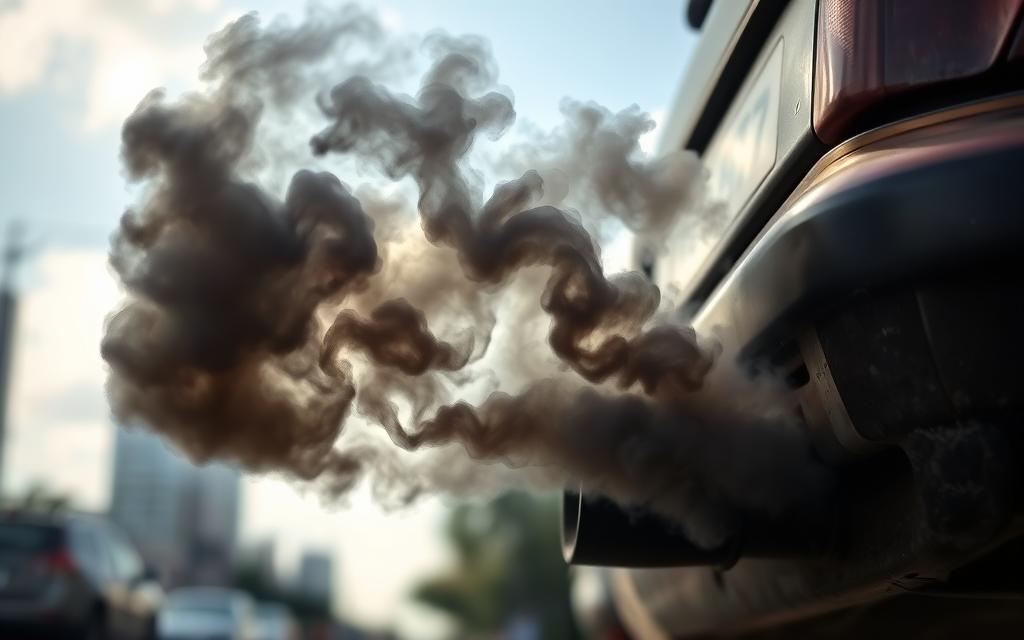
Excessive smoke from your vehicle’s exhaust can mean there’s a problem with the muffler. The color of the smoke can tell you a lot. It helps you find and fix the issue before it gets worse.
Understanding Different Exhaust Smoke Colors
The color of the exhaust smoke can tell you a lot about your muffler and engine. Here’s what different colors mean:
- White Smoke: White smoke that lasts is not normal. It might mean coolant is leaking or there’s another engine problem.
- Blue Smoke: Blue smoke means oil is burning. This could be because of worn piston rings or engine leaks.
- Gray Smoke: Gray smoke means transmission fluid is burning. This could cause gear problems if not fixed.
- Black Smoke: Thick black smoke is a big problem. It usually means fuel lines are blocked, sensors are damaged, or fuel mix is too rich.
What Smoke Can Indicate About Muffler Problems
Any unusual exhaust smoke should be checked right away. It could mean bigger problems, like muffler issues. Clogged or damaged mufflers can cause smoke and harm your engine and emissions systems.
Fixing exhaust leaks or muffler problems can cost a lot. It can be a few hundred dollars for simple fixes or over $1,000 for bigger issues. Regular checks and maintenance can save you money and keep your vehicle safe and legal.
Weak Acceleration or Power Loss

If your car’s acceleration feels slow or you notice a drop in engine power, it might be due to a clogged muffler. The muffler is key in the exhaust system. Any blockages can really hurt how well your engine works.
Symptoms of Reduced Engine Power
A clogged muffler can show in many ways. You might notice:
- Slow or delayed response when pressing the accelerator
- Difficulty maintaining speed, specially on hills or when passing
- Reduced engine power and overall performance
- Noticeable decrease in fuel efficiency
Connection to Muffler Blockage
The muffler’s main job is to cut down on noise and emissions from the engine’s exhaust. If it gets clogged or restricted, it stops exhaust gases from flowing right. This causes backpressure, which cuts down the engine’s power and acceleration.
Studies show that about 15% of the time, a clogged exhaust system, like a clogged catalytic converter, is the reason for slow acceleration. Fixing the muffler blockage can help get your car’s power and speed back.
“A properly functioning muffler is essential for efficient engine operation and optimal power delivery. Any obstructions in the exhaust system can significantly hamper your vehicle’s engine power and acceleration capabilities.”
Vehicle Vibrations or Shaking

If your car vibrates or shakes, it might mean there’s a problem with your exhaust system. These shakes can feel through the steering wheel, seats, or floor when your car is idling or speeding up.
What Causing Vibrations Can Indicate
A clogged or blocked catalytic converter often causes back pressure. This can hurt your car’s performance and cause vibrations. Also, if your exhaust system is blocked, your car might idle unevenly and shake when you start it or drive.
A damaged or perforated muffler can mess up exhaust flow. This leads to more exhaust gases and higher pressure. This makes the vibration problems worse.
Importance of Addressing Vibration Issues Early
It’s important to fix these vibration problems quickly. They can mean there’s a bigger issue with your exhaust system. If you ignore these signs, you might face more damage, less fuel efficiency, and expensive repairs later.
Regular checks and upkeep of your exhaust parts can stop many vibration problems. By watching for issues and fixing them early, your car will run better and longer.
Check Engine Light Activation

The check engine light is a key warning in modern cars. It alerts drivers to engine or exhaust system issues. If it lights up, it’s important to take action and fix the problem. A clogged or damaged muffler is a common cause.
Common Reasons for Check Engine Light
The check engine light can be caused by many things, including:
- Faulty oxygen sensors
- Loose or damaged gas cap
- Catalytic converter problems
- Mass airflow sensor malfunction
- Spark plug or ignition coil issues
- Exhaust gas recirculation (EGR) valve problems
- Thermostat malfunctions
- Battery or charging system problems
How Muffler Problems Affect Engine Diagnostics
A clogged or damaged muffler can also cause the check engine light to come on. Muffler problems can affect the oxygen sensors and catalytic converter. These are key for controlling emissions. When they don’t work right, the check engine light goes on, needing a mechanic’s help.
It’s wise to get a mechanic’s help when the check engine light comes on. The code it shows doesn’t tell you exactly what’s wrong. But it helps the mechanic find the problem. Ignoring it can lead to bigger and more expensive issues later. So, it’s best to fix it quickly.
“Understanding the common reasons for check engine light activation is crucial, as prompt diagnostics by a qualified mechanic can help prevent more extensive and costly problems in the future.”
Strange Smells Coming from Exhaust
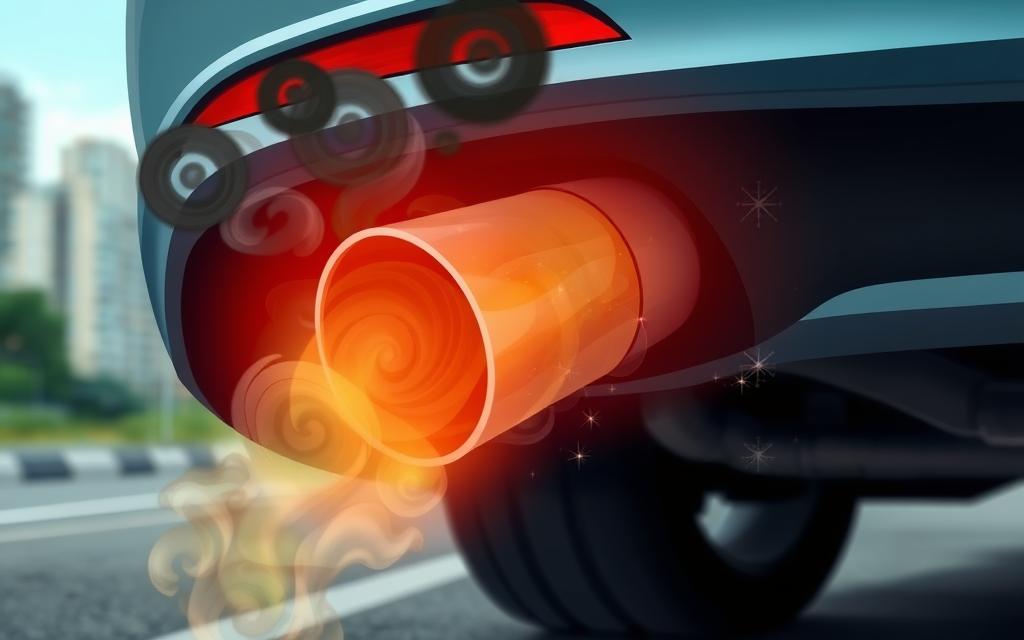
If you notice odd smells from your car’s exhaust, act fast. Weird smells often mean there’s a problem with the muffler or exhaust system. Knowing what the smell is can help figure out what’s wrong and how to fix it.
Identifying Malodorous Emissions
A smell like rotten eggs from the exhaust might mean your catalytic converter is broken. This part helps turn bad exhaust odors and emissions into safer stuff. If it’s not working right, it can hurt your car’s performance and cause trouble with emissions tests.
A sweet smell from the exhaust could mean a leaky head gasket. This lets coolant mix with the engine’s burning fuel, which can cause it to overheat. A smell like gasoline, often with black smoke, might mean there’s a problem with how the fuel is being used or a blocked air filter.
Potential Risks of Ignoring Warning Signs
Ignoring strange smells from your exhaust can be very dangerous. An exhaust leak can let harmful carbon monoxide into your car, which is very dangerous. A failing catalytic converter can get too hot, get dirty, or just wear out, causing more problems and emissions issues.
A car that’s burning too much fuel can cause backfires or damage the catalytic converter. Not fixing these problems can make them worse and cost a lot more to fix later.
It’s important to check for any unusual smells from your car’s exhaust. This keeps your car running well and makes sure you’re safe while driving. By fixing these problems quickly, you can avoid bigger issues and keep your car running smoothly while reducing harmful emissions.
Impact on Vehicle Emission Systems
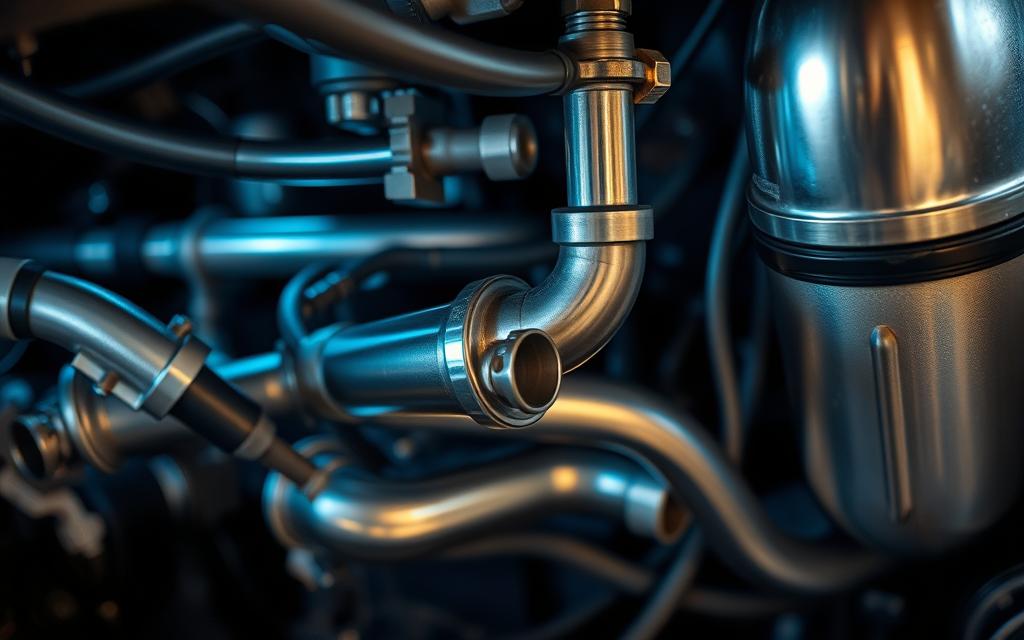
A well-working muffler is key for a car’s emission system. It cuts down on harmful pollutants like hydrocarbons and carbon monoxide. Modern filters can remove up to 90% of these pollutants, making a good exhaust system vital for the environment.
Understanding Emission Regulations
Environmental rules are strict to reduce car pollution. These rules set standards for emissions to protect health and the planet. A bad muffler can cause more pollution, failing tests and harming the environment.
Importance of a Functional Muffler for Emissions
A good muffler is more than just following rules. It keeps the car’s emissions system working well. A well-designed exhaust system improves engine performance and fuel use. But, a faulty muffler can harm the engine and increase pollution.
| Emission Control Component | Function | Potential Impact of Muffler Issues |
|---|---|---|
| Catalytic Converter | Converts harmful pollutants into less harmful substances | Decreased engine performance, increased emissions, potential engine damage |
| Diesel Particulate Filter (DPF) | Traps and filters out particulate matter in diesel exhaust | Increased backpressure, reduced fuel efficiency, potential clogging |
| Exhaust Pipes | Facilitates the flow of exhaust gases out of the vehicle | Restrictions, turbulence, and decreased fuel efficiency |
In short, a well-kept muffler is crucial for a car’s emission system. It’s important for following environmental rules and reducing pollution.
Clogged Muffler Diagnosis Process
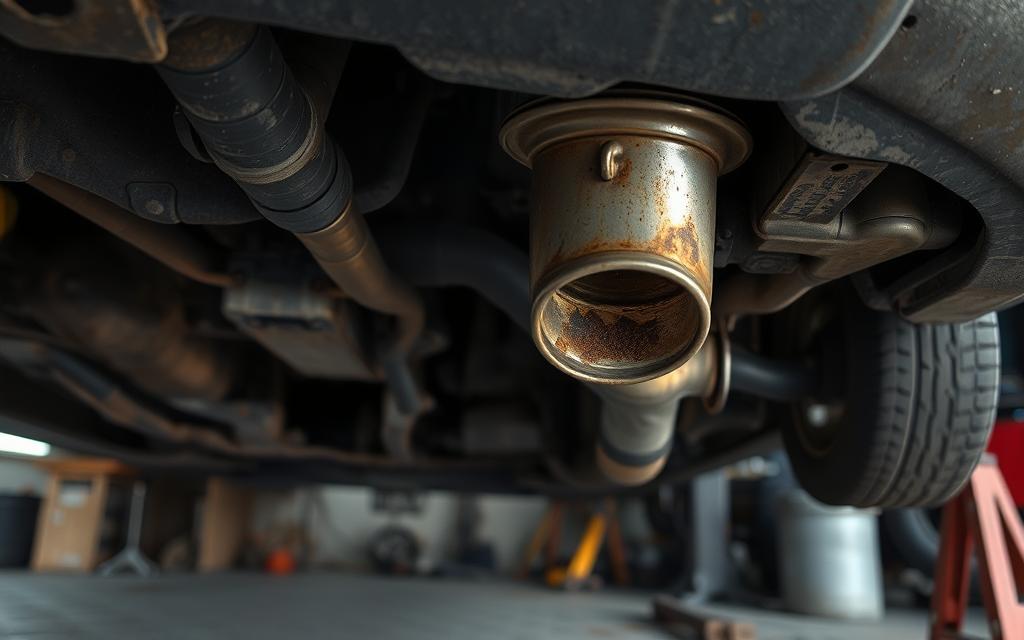
Figuring out if a muffler is clogged takes a detailed look and some special tools. You need to check it visually, listen for odd sounds, and use diagnostic tools. This way, you can find out what’s wrong and fix it.
Steps for Inspecting Muffler Health
- Visual Inspection: Look closely at the muffler and exhaust for damage, rust, or blockages. Rust, holes, or wear can show a problem.
- Listening for Abnormal Noises: Start the car and listen for strange sounds from the exhaust. Loud noises, rattles, or hisses mean it might be clogged.
- Measuring Exhaust Back Pressure: Use a back-pressure tester to check exhaust pressure. A drop in vacuum or high back pressure could mean a blockage.
- Smoke Testing: A smoke machine can find leaks or blockages in the exhaust, including the muffler. It helps find where the problem is.
Tools Needed for Muffler Inspection
- Back-pressure tester: This tool checks exhaust pressure, helping find muffler blockages.
- Smoke machine: It injects smoke to find leaks or blockages in the exhaust, including the muffler.
- Diagnostic scanners: These tools give detailed info on engine performance, helping spot muffler problems.
Regular muffler inspection and using the right diagnostic tools keep the exhaust system healthy. This ensures your car runs well. Fixing muffler issues early prevents bigger, more expensive problems later.
Preventative Maintenance for Mufflers
It’s important to keep your vehicle’s muffler and exhaust system in good shape. Regular checks and care can make these parts last longer. This also helps avoid expensive repairs later on.
Routine Checks and Inspections
Have your muffler checked at least once a year. Look for rust, cracks, or damage. Also, listen for any odd noises or changes in the exhaust sound.
During maintenance, your mechanic should check the muffler and exhaust system connections. Loose connections can cause leaks and damage. Fix any problems right away to stop them from getting worse.
Tips for Extending Muffler Life
- Avoid short trips that don’t warm up the exhaust system. This can cause corrosion.
- Keep the underside of your vehicle clean to protect the muffler from debris and moisture.
- Use high-quality parts when fixing the muffler or exhaust system. This ensures they work well for a long time.
- Think about getting a muffler shield or heat shield to protect the system from the elements.
By following these tips, you can make your vehicle’s muffler and exhaust system last longer. This keeps your vehicle running well and saves you money on repairs.
“Routine maintenance is the key to prolonging the life of your vehicle’s muffler and exhaust system. Catching problems early can save you time and money in the long run.”
When to Visit a Mechanic
Knowing when to get help for your car’s muffler is key. Ignoring muffler problems can cause more damage. It can also hurt your car’s performance, fuel use, and safety.
Identifying Severe Muffler Issues
Listen for loud exhaust noises and look for muffler damage or rust. A steady check engine light is another warning sign. These signs mean your muffler needs quick attention.
Choosing the Right Auto Repair Service
For muffler problems, pick a trusted auto repair service. They should know about professional muffler service. Choose mechanics who focus on exhaust repairs. They can find and fix your muffler issues right.
Keeping your car’s exhaust system in good shape is important. Watch for muffler trouble and fix it fast. This way, you avoid expensive repairs and keep your car running well.
| Common Muffler Issues | Symptoms | Recommended Action |
|---|---|---|
| Excessive Noise | Loud, persistent exhaust noise | Schedule auto repair service for professional muffler service |
| Visible Damage | Rust, corrosion, or physical damage to the muffler | Schedule auto repair service for professional muffler service |
| Check Engine Light | Persistent check engine light activation | Schedule auto repair service for professional muffler service |
Fixing muffler problems quickly and getting help from a skilled auto repair service is smart. It keeps your car running well and safe to drive.
DIY Solutions versus Professional Help
Choosing between DIY fixes and professional auto service for muffler issues is crucial. Some minor problems, like tightening clamps or using exhaust tape, can be done by car owners. But, complex repairs need a skilled mechanic’s help.
Benefits of Professional Diagnosis
Professionals have the right tools and knowledge to fix muffler problems. They can find the real cause, like a clogged muffler or damaged parts. Their expertise ensures the problem is fixed right, keeping your car safe and legal.
Simple Fixes Car Owners Can Attempt
If you’re into DIY car repair, you can try a few simple tasks. Tightening clamps, using exhaust tape, or replacing hanger brackets are doable. But, remember, these are just quick fixes. For real repairs, you should call a pro.
In summary, while you can handle some minor muffler issues, complex problems need a pro. Professional auto service ensures your car’s exhaust system is safe and meets standards.
Recap of Symptoms and Resolution
In this guide, we’ve looked at signs of a clogged muffler. These include odd noises, less engine power, lower fuel efficiency, and strange smells. These signs mean there’s a problem with the exhaust system that needs fixing fast.
Quick Summary of Key Symptoms
A clogged muffler can show up in many ways. You might notice your engine’s power drop, see more smoke, or see the check engine light turn on. Catching these signs early and fixing them can stop more damage and keep your car legal.
Final Thoughts on Muffler Maintenance
Keeping your car’s exhaust system, like the muffler, in good shape is key. It helps your car run better, saves fuel, and is better for the environment. Regular checks, quick fixes, and solving problems fast can make your muffler last longer. This way, you’ll have a smooth and green drive.
FAQ
What are the common symptoms of a clogged muffler?
How does a properly functioning muffler contribute to vehicle performance and emissions?
What are the effects of a clogged muffler on engine performance?
How can a clogged muffler impact fuel efficiency?
What are the signs of engine overheating due to a clogged muffler?
What do different exhaust smoke colors indicate about muffler problems?
How can a clogged muffler cause power loss and weak acceleration?
What are the potential causes of vehicle vibrations or shaking related to muffler issues?
Why might a clogged muffler trigger the check engine light?
What types of strange smells from the exhaust can signal muffler problems?
How does a clogged muffler impact a vehicle’s emissions and compliance with regulations?
What steps are involved in diagnosing a clogged muffler?
How can regular muffler maintenance help extend its lifespan?
When should a vehicle owner seek professional help for muffler problems?
What are the benefits of having a professional diagnose and repair muffler problems?

Jack Thompson is a writer and seasoned auto mechanic with over 15 years of experience in the automotive industry. Known for his expertise in vehicle mechanics, Jack has a deep understanding of car and truck systems. His skills, honed through years of hands-on experience, have made him a trusted name in the field. Jack is committed to providing valuable insights into car maintenance and repair, helping vehicle owners keep their vehicles in top condition.

